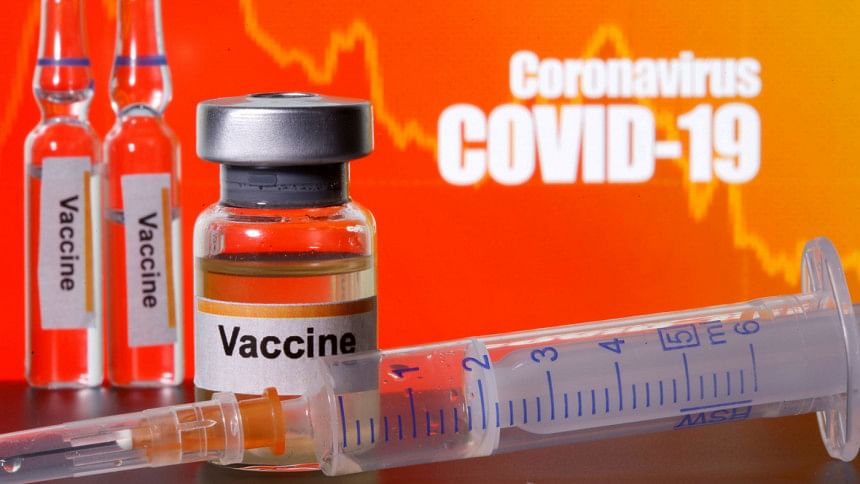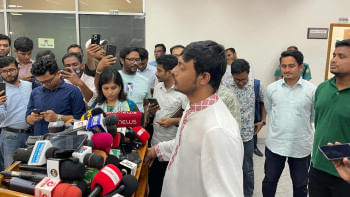Cheap and fast vaccination is an urgent need for poorer countries

There is a global race going on now for the rapid development of a Covid-19 vaccine. As of July 27, pharmaceutical companies worldwide were working on 164 candidates, including 25 that are being tested in people, according to the World Health Organization (WHO). Unfortunately, it is not certain that developing countries like Bangladesh will necessarily benefit from the vaccine. "Vaccine nationalism" is threatening to make it difficult for third-world countries to secure inexpensive and adequate supplies of reliable vaccines. Vaccine nationalism occurs when a country manages to secure doses of vaccine for its own citizens or residents before they are made available in other countries. This is done through pre-purchase agreements between a government and a vaccine manufacturer. The bottom line is, vaccine nationalism will affect the distribution of Covid-19 vaccines, which is likely to be based on high-income countries' purchasing power rather than the risk of transmission.
Not long ago, in a paper in the Harvard Business Review (HBR), three scientists expressed their concern over rich countries bankrolling vaccine development and leaving only the crumbs for developing countries. They strongly rejected such nationalistic responses, and voiced the need for a centralised, trusted governance system to ensure appropriate flow of capital, information and supplies. They wrote: "Experts in epidemiology, virology, and the social sciences—not politicians—should take the lead in devising and implementing science-based strategies to reduce the risks that Covid-19 poses to the most vulnerable across the globe and to reduce transmission of this novel virus for all of us."
It is expected that a Covid-19 breakthrough could beget off-the-charts expensive treatments. Some of the existing drugs that scientists are testing as Covid-19 treatments have a special status for rare disease treatments, and the price tags to match—prompting early warnings from academics and drug pricing reform advocates that if one is effective, access could be a critical issue.
On July 31, Dr Anthony Fauci, head of the US National Institute of Allergy and Infectious Diseases, declared that he was optimistic that a vaccine to vanquish Covid-19 would be widely available soon. Later, while testifying before a panel of the US House of Representatives, he backpedalled and toned down his initial enthusiasm, saying, "Once a coronavirus vaccine is approved as safe and effective, Americans should have widespread access within a reasonable time."
Fauci expressed "cautious" optimism that a vaccine would be available by 2021. But there was a catch. There will be a priority list for who gets early vaccinations. "I don't think we will have everybody getting it immediately," he said.
Things have moved fast since then. On August 11, the US government signed a USD 1.525 billion deal with Moderna, an American biotechnology company, which will manufacture and deliver 100 million doses of its experimental vaccine. The US has also made similar deals with two other drug makers.
The US government's Operation Warp Speed is bankrolling several other efforts and it also has the option for an additional 400 million doses of Moderna's vaccines. The US government's largesse is viewed with suspicion, however. It is being seen as funding its efforts to scoop up all available vaccines in the US and Europe. The question is, could the US government be trying to leverage its deep pockets to garner influence over foreign countries?
While it is understandable if the US government is asking for a first dip in the pie, with a total commitment of USD 2.48 billion for Moderna's vaccine candidate, there is global resentment that it is squeezing out other buyers. But US experts in unison said, "We want a new vaccine as fast as possible, where each month matters," and vaccines often take 10 years to bring to market. Consequently, the US government stepped in to get Moderna and others to fast-track the vaccine development. Moderna set a record by producing its vaccine in 42 days after receiving the genetic sequence of the virus that causes Covid-19.
As expected, for every major Covid-19 related development in the clinical sphere, there is good news soon followed by bad news. Each prospective vaccine goes through three phases of study in humans. Phase 3 trials can determine that the vaccine works better than a placebo and doesn't cause harm to the people who get it. To beat the US and the west, Russia cut short the third phase and President Putin announced, on August 10, that Sputnik-V is going into mass production. Meanwhile, in the US and the UK, phase 3 clinical trials are underway for Moderna's and Oxford/AstraZeneca's new coronavirus vaccines.
The price of Moderna's vaccine is USD 25 for the US but twice as much for non-US customers. One analyst estimated that each person would need five doses of a Covid-19 vaccine to be fully protected. "The nightmare situation really is breakthrough, extremely effective Covid-19 treatment that's priced so high that hospitals and patients can't access it," said Kao-Ping Chua, a paediatrics researcher at the University of Michigan.
The Russian vaccine is cheaper, but Russia is taking a dangerous step by jumping ahead of the phase 3 trials. "I think it's really scary. It's really risky," said Daniel Salmon, the director of the Institute for Vaccine Safety at Johns Hopkins University. Financing the quest for vaccines is proving to be a big hurdle, and Prof Bernard Avishai of Dartmouth poses a challenging question, "Is financial engineering the key to ending pandemics?"
In the past, most high-income countries turned to pharmaceutical companies within their own borders for production. High-income countries directly negotiated large advance orders for the vaccine, crowding out poor countries. Although several of those rich countries, including the United States, agreed to make vaccine donations to low- and middle-income countries, they only carried out these donations after ensuring they could cover their own populations first. But according to WHO Director-General Tedros Adhanom Ghebreyesus, "Vaccines only realise their true power when they are deployed to protect the poorest and most vulnerable."
In their HBR paper, Prof Rebecca Weintraub of Harvard Medical School and her co-authors discussed different financing mechanism to beat vaccine nationalism. In the advanced market commitment (AMC) model, "donors make a commitment to subsidise the purchase of a yet-to-be-developed vaccine for developing countries, providing vaccine manufacturers with an incentive to invest in what's needed to bring a vaccine to the developing world market."
Along with vaccines, cheap and fast testing for the virus is also essential. My economics professor at Boston University, Dr Larry Kotlikoff, along with Harvard's Michael Mina, have pushed for a USD 1 daily test which could allow at-home testing. Fortunately, some Good Samaritans are coming forward at this time of crisis to help testing, treatment, and vaccination of the world's poor. Bill Gates announced on August 7 that his foundation would spend USD 150 million to distribute vaccines, if they are found, to some of the world's poorest people. The Gates Foundation is funding the Serum Institute of India, the largest manufacturer of vaccines globally by volume, to produce 100 million doses that would cost at most just USD 3 each.
Another initiative, COVAX Facility aims to deliver two billion doses of safe, effective vaccines by the end of 2021. These vaccines will be delivered equally to all participating countries, proportional to their populations, initially prioritising healthcare workers, then expanding to cover 20 percent of the population of participating countries. Further doses will then be made available based on country need, vulnerability and Covid-19 threat in order to address concerns that the poor might get free or cheap vaccines during a pandemic but pay dearly for annual Covid-19 shots thereafter.
It has to be understood that when all is said and done, the fight against Covid-19 pandemic is not a zero-sum game. There is so much interdependence among various nations that we all gain from global development and fair distribution of rapid and inexpensive tests, treatments, and vaccines for Covid-19.
Dr Abdullah Shibli is an economist and currently works in information technology. He is also Senior Research Fellow, International Sustainable Development Institute (ISDI), a think-tank in Boston, USA.

 For all latest news, follow The Daily Star's Google News channel.
For all latest news, follow The Daily Star's Google News channel. 



Comments